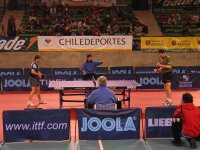Yeah I agree it can be a crutch for people as opposed to admitting your technique could be improved upon.
I'd never really considered the impact of mental training until last year and it's been the difference in my game this year.
Sent from my D6503 using Tapatalk
As Carl said, I am talking about the fact that even the mental game improves when pressure situations are practiced. IF you play deuce alternating serve matches a lot, your game at deuce points improves. I play a lot of tournaments so i can write a lot about the mental game, especially in the USA where rating points can put you under pressure for no good reason if you let them.
I am currently mentoring someone who is largely a beginner and its frustrating to hear him focus on the mental game when based on what I know about his training, he has inevitable gaps that will be bridged with experience if he is patient. Even if you practice hard and play well in practice matches, it takes about 6 months on average (a number pushed around by many coaches independently, but I wish it had stronger empirical support) to get your practice /drill skills to show up comfortably and expertly in matches.
Table tennis is complicated, but you have to spend a lot of timing understanding it and playing it decently before you start thinking you have psychological issues. When you set hard goals for yourself, you will face challenges, but you have to talk to people to understand what is the norm and what is a deviation.
I will tell a story about myself. I started playing tournaments in 2011 and by 2012 December with good coaching, I had become a decent/strong intermediate player (after some ups and downs in 2012 because of personal relationship issues). I expected to continue to improve by my progress stalled and I suffered lots of upset losses. The low point for me was losing to a decent player who limped and often chopped (With inverted rubber on both sides) 0-3, 0-11 in the last game.
On the way back home from the tournament, where the juniors with whom I often play had played excellently and won prizes, I asked my coach and the juniors what I was doing wrong. And my coach told me to listen to the juniors, because your opponents know where they get their points off you. And the juniors said I refused to spin the ball. And I argued that I did spin the ball, and they said that no that I didn't. So I spent a lot of time working on my forehand and learning to loop with my backhand. I beat two opponents significantly above my rating after I committed to spinning the ball more on both sides. The guy who beat me 0-11 started suffering a series of bad losses to me immediately I started spinning on both sides and now, we don't even act as if we are rivals or anything like that as I have left that level of play behind.
So the easy answer would have been to say that I was a choker. But the truth is that it is hard to control the ball when you don't topspin or know how to consistently generate it. While many people do choke, choking is really about nervous pressure driving down your level, and things like sweaty palms, panic attacks, serving the ball into the net when match point up/down etc. should not be confused with missing smashes, flat hitting the ball long, looping backspin into the net or losses to long pips players who are at a lower level than you.












